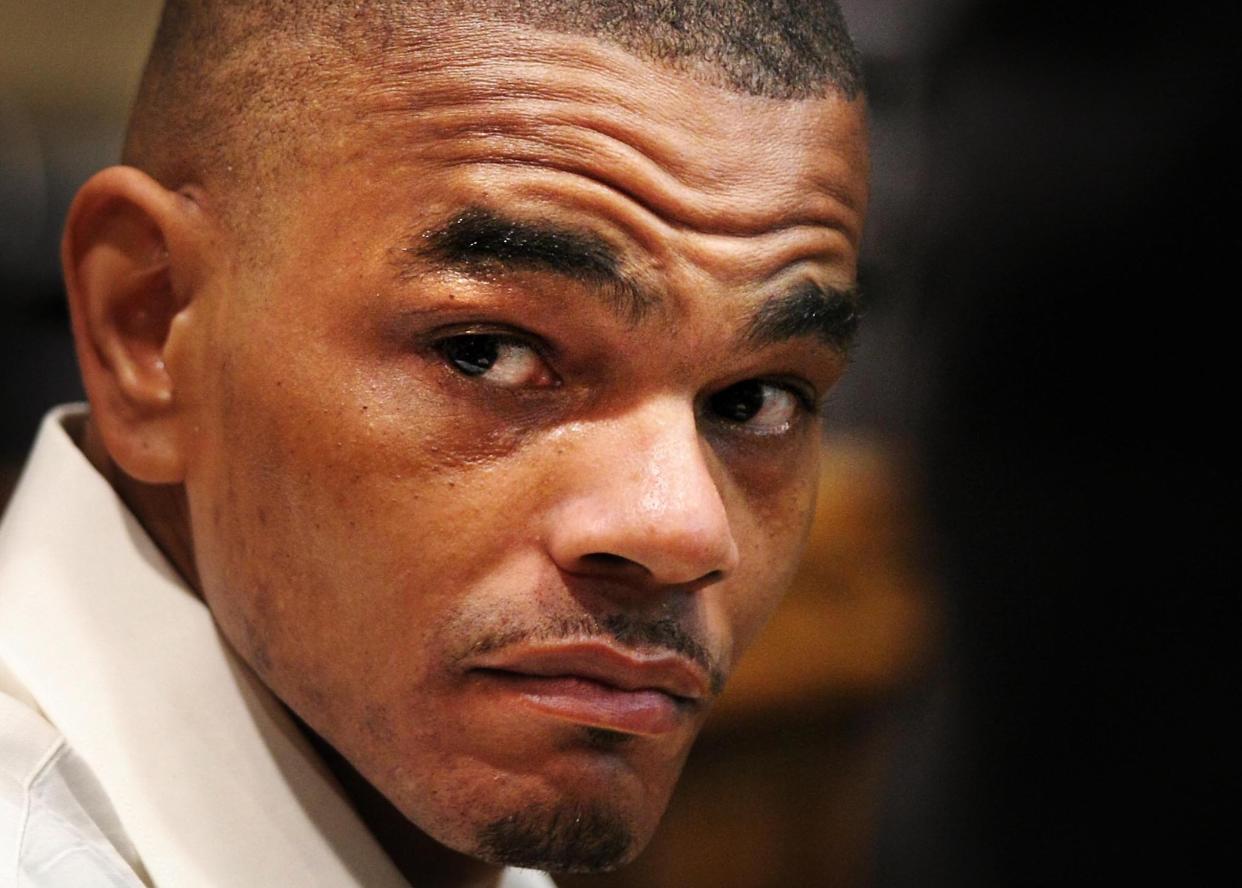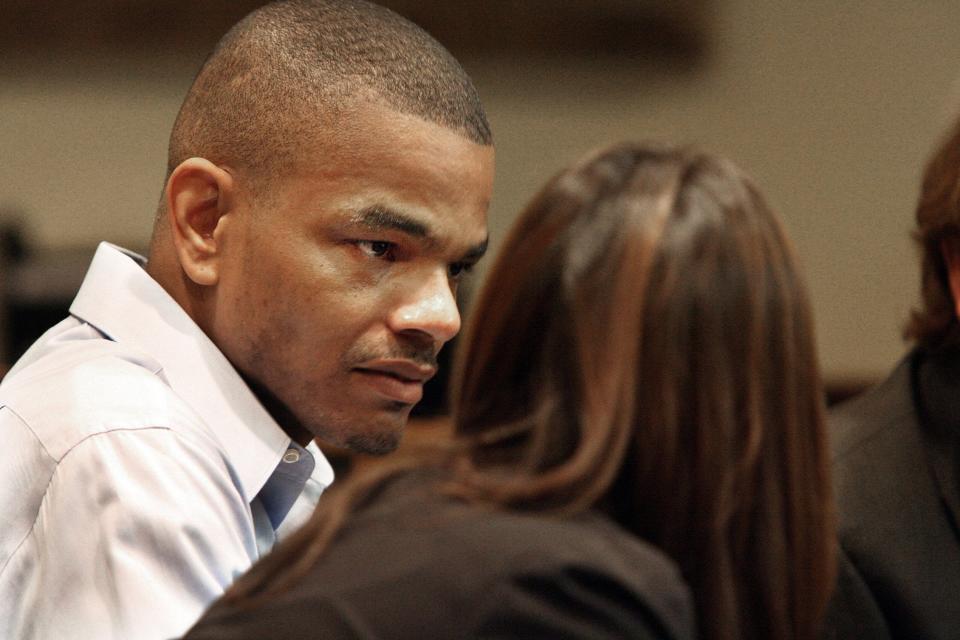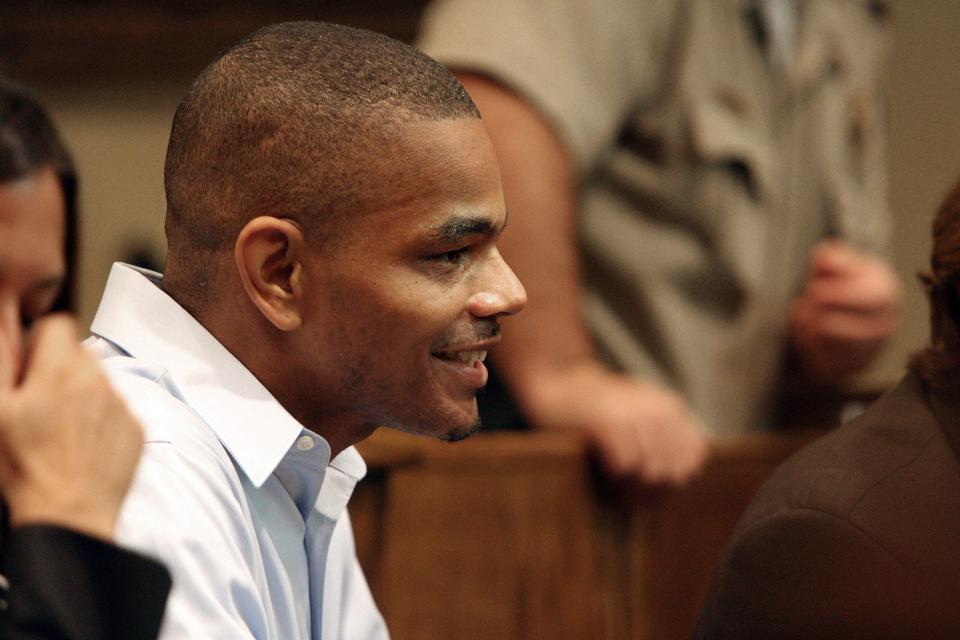Is Memphis death row inmate Jessie Dotson innocent? Filing claims MPD forced false confession

The man convicted of killing six people, including two children, in the now-infamous Lester Street killings in Binghampton, has requested a judge to reverse his convictions for the murders, claiming he was innocent, coerced into a false confession by police and that a number of errors were committed by both the prosecution and his original defense team.
The filing argues that Jessie Dotson — who was convicted in 2008 of killing his brother, three adults and two children along with injuring three other children — was threatened by police and that key witnesses had faulty memories of the incident.
Dotson is currently on death row in the Riverbend Maximum Security Institution in Nashville for the murders. One of the children that survived the attack, Dotson's 9-year-old nephew, named Dotson as the man to carry out the killings.
That nephew, along with other witnesses and members of Dotson's family, and Dotson's confession were at the heart of the prosecution since no DNA evidence linked Dotson to the killings.
In addition to police, prosecutorial and defense misconduct being alleged, the filing also looked at an independent TV film crew — called "The First 48" and "After The First 48" — being embedded with the Memphis Police Department as prejudicial to Dotson's case.
The 249-page filing lists 50 different claims that Dotson's new defense attorney, Kelley Henry, argued should result in his conviction being overturned. It also includes an additional 39 examples of what Henry argued constituted ineffective assistance of counsel.
Some of those claims also point to the killing actually being a gang retaliation, citing the fact that some of the victims were armed, Dotson's relative had recently crossed members of the gang he was in, the scene was reminiscent of gang and cartel retribution killings, and that Dotson did not have "so much as a scratch on his body."
Did the Memphis Police Department coerce Dotson into confessing?
Henry described the interrogation as lasting seven hours, with Dotson being "sleep deprived and psychologically manipulated" while telling detectives he was innocent. At numerous times, Henry wrote that Dotson invoked his right to remain silent and asked for an attorney. Those requests were ignored by police as the interrogation went on.
"We are going to go hard at Jessie tonight," then-Lt. Toney Armstrong was quoted as saying in the show that was filming the interrogation.
"And they did," Henry wrote in the filing. "Over the course of the evening, Lt. Armstrong threatened to arrest Jessie's mother, Priscilla Shaw, and sister, Nicole Dotson. He threatened to kill Jessie. He threatened to put Jessie in general population with the Gangster Disciples in the jail at 201 Poplar and let them kill him. He lied to Jessie and told him that they had Jessie's footprints in blood at the scene. He made promises to Jessie, but told him he had to hurry or else Lt. Armstrong couldn't help him. And then, he repeatedly played the tape of C.J. [Dotson, Jessie's nephew,] saying that Jessie did it. Jessie broke. He confessed."
Court updates: Shelby Co. judge reprimanded for re-sentencing comments, fourth judge reprimanded in a year
But, Henry goes on to say the confession wasn't consistent with the crime scene evidence. She also said it didn't include details any additional details — and consisted of information that the family had already known and was "fed" to Dotson during his interrogation.
C.J. Dotson, Jessie Dotson's nephew, was key to the prosecution's case. The kid had been stabbed in the head during the killings and survived, going on to name Jessie Dotson as the person to carry out the murders. But Henry argues in the latest filing that C.J. Dotson's memory had been tampered with by police and that he wasn't mentally prepared to name the suspect. She also pointed to C.J. being on "mind-altering medications" when he was interviewed, citing medical records that showed he was prescribed fentanyl, morphine, Propofol and hydrocodone.
C.J. Dotson was first interviewed by a trained forensic child advocate named Pat Lewis. During the Lewis interview, the filing said C.J. Dotson named two separate people as suspects, and that he was repeating what he had heard the assailants say. That interview was stopped short because Lewis believed C.J. Dotson was becoming distressed about reliving the murders.
"Though it had been decided that for the child's welfare he should only be questioned by trained experts, Sgt. [Caroline] Mason failed to follow the protocol," the filing said. "On March 7, 2008, after Police Chief [Larry] Godwin told the homicide detectives that he was bringing in outside agencies, Sgt. Mason took it upon herself to go back to C.J. one last time."
Henry alleges in the filing that Mason told C.J. Dotson of the gifts that he'd been given ― including gift cards, balloons and a teddy bear ― and the filing implies that Mason used them to get C.J. Doton to name a suspect.
"Open your mouth and talk to me," Mason was quoted as saying in the part of the interview that was recorded. "You been talking to me the whole time I been here. So talk to me now. Don’t stop now ‘cause we need to get these bad guys, ‘cause they’re still out there, and I want to get them so that they won’t cause you any more problems. You don’t have anything to worry about. That’s why I’m here. That’s why I came every day, faithfully, to see about you. Because I want you to remember what happened and tell me who these guys are, and you won’t have to deal that right now, anymore. Okay? Okay? Okay, C.J.?"

Mason's full conversation with C.J. Dotson was not recorded, but Henry alleged Mason reinforced Jessie Dotson as the actual suspect to his nephew by praising him for saying certain things, and not praising him for others.
Four days after Mason spoke with C.J. Dotson, another expert — Linda Steele — was brought in to interview the 9-year-old at the suggestion of the FBI. Her report was never made publicly available, nor was it disclosed to Jessie Dotson's defense team. Henry said that report has still not been given to her and the current defense team.
"In an email message to [Assistant District Attorney] Ray Lepone, in preparing for trial, Ms. Steele warned, 'If I were to testify for you in any capacity, my contact with the kids might come up as an issue; so I did document it," the filing said.
Prosecutors, according to the filing, also did not disclose to the defense that the psychologist treating C.J. Dotson said that the child's memory was not reliable.
The tape of him naming Jessie Dotson as the killer, Armstrong told "The First 48," was key in his confession.
"Once I played the tape, actually his heart started beating so fast I could see it in his throat, you know, in his neck, and I wasn't going to let him off here," Armstrong was quoted in the filing as saying. "Again, I was not going to give him a chance to recoup from that."
Missing evidence, missing footage and The First 48's influence
MPD has said there is no footage in their custody of Dotson's interrogation, but, the filing said, both "The First 48" and a camera hidden in a smoke detector inside the room, owned and operated by MPD, filmed the interrogation.
"The First 48" has declined to turn over the entire clip of the interrogation, citing journalistic privilege, and even said that the files had been destroyed. Henry argued in the filing that the footage should be turned over and that the show became an "agent of the state" when they signed a contract for exclusive access, which media outlets almost never receive.
More: MPD: Memphis crime is mostly down, homicides create perception of 2023 crime increase
That access also included filming the crime scene on Lester Street as evidence was being collected. That footage was also not disclosed, Henry said in the filing.
Footage is not the only hiccup Henry said the team has experienced in trying to investigate Dotson's potential innocence nearly 16 years after his conviction. Her team also has been denied access to "critical files and interviews of law enforcement witnesses" that are said to be in the original case file.
That file should be housed with the Shelby County District Attorney's Office, but the original was given to the Tennessee Attorney General after the passage of a bill that gives the AG jurisdiction in collateral review death penalty cases. That law was ruled unconstitutional by a Shelby County Criminal Court judge in July 2023, and the AG's office has appealed that ruling. The DA's office is a party to that constitutional challenge.
MPD files are also missing from the department, which it told Henry could be found in the court file. Both of these practices, she said in the filing, go against her experience with MPD and DA's office policy.
Other evidence that Henry argued pointed to the killing being a form of gang retaliation, such as a backpack with a bandana, live ammunition and photos of high-ranking members of the Gangster Disciples — a gang one of Dotson's relatives was part of and had recently crossed — were taken from the crime scene by a member of the Organized Crime Unit, but those pieces of evidence, the filing said, went missing.
The influence of "The First 48" also exerted pressure on MPD to solve the murders, Henry wrote in the filing. She alleged that pressure even extended to Mason's desire to get a suspect name from C.J. Dotson, with Henry saying that she was "a frequent 'star'" of the show who "loved the limelight."

"According to a former Shelby County assistant district attorney general who worked with her, [Mason] even carried around photographs of herself to autograph for her 'fans,'" the filing alleged.
Then Shelby County District Attorney Bill Gibbons, at one point, wrote to MPD urging it to end its contract with "The First 48" since it was "so detrimental" to the case, the filing said. It added that the show was "so prejudicial" that Jessi Dotson sought a venue change, which was granted, and a jury was selected from Nashville residents.
Brady and Miranda violations and ineffective assistance of counsel raised in filing
In addition to files not being available to Henry in the latest filings, Henry also alleged that the original trial saw the prosecution withhold reports, footage and evidence that could have been exculpatory for Dotson.
Henry also said Dotson's Miranda rights were violated when police did not respect his invocation of silence and request for a lawyer. She said his rights were violated again when he asked Armstrong to stop questioning him so he could speak with his mother, which the filing alleges was not allowed to happen.
A fourth Miranda violation is alleged when Dotson was signing his statement after giving a confession, where Henry said Mason did not inform him of his rights and then "covered up the warnings with her hand" as Dotson signed.
According to the filing, prosecutors on the case also did not disclose "favorable treatment" and deals for shorter prison sentences in exchange for testimony that would benefit the prosecution.
The prosecution also, according to the filing, worked with Dotson's relatives to try and make him angry on the stand to "prey on racial prejudices."
"According to a former assistant Shelby County district attorney general with knowledge, Ray Lepone (one of the prosecutors in the original case) often brags on the research he conducted in advance of Jessie Dotson's testimony," the filing read. "Lepone enlisted the help of Jessie's family to help him come up with a way to make Jessie angry on the witness stand. His hope was to make Jessie lose his temper and, in turn, 'scare' the jury, playing on the stereotype of the Black male superpredator."
That plan, the filing alleged, was to press Dotson into reenacting what Armstrong did during the interrogation. When he did, the filing said he also mimicked Armstrong's "anger, tone and volume. Everyone agreed the ploy worked. The jury was scared."
In total, the filing also listed 39 instances of what it described as ineffective assistance of counsel, including not objecting to statements prosecutors made, not doing a thorough investigation and not properly preparing Dotson to testify.
After receiving a response from the state, along with the record of all past proceedings, Henry said she file motions for depositions and for documents the defense team hasn't received. After having those documents, she said she will request an evidentiary hearing.
Lucas Finton is a criminal justice reporter with The Commercial Appeal. He can be reached at Lucas.Finton@commercialappeal.com, or (901)208-3922, and followed on X, formerly known as Twitter, @LucasFinton.
This article originally appeared on Memphis Commercial Appeal: Jessie Dotson is on death row. A new filing claims he is innocent

